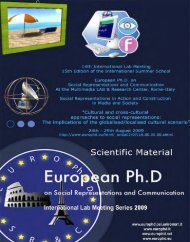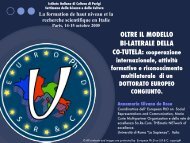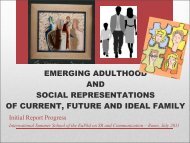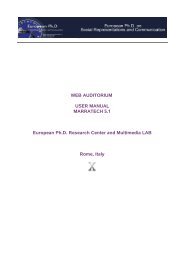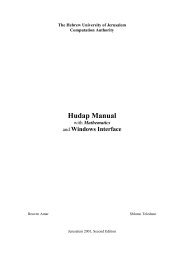The "boomerang" effect of the radicalism in discourse analysis
The "boomerang" effect of the radicalism in discourse analysis
The "boomerang" effect of the radicalism in discourse analysis
Create successful ePaper yourself
Turn your PDF publications into a flip-book with our unique Google optimized e-Paper software.
And even before <strong>in</strong> Argu<strong>in</strong>g and Th<strong>in</strong>k<strong>in</strong>g (1987)<br />
“However, it might be pr<strong>of</strong>itable to explore <strong>the</strong> rhetorical dimensions <strong>of</strong> this <strong>the</strong>oretically important<br />
concept <strong>of</strong> social representations.”<br />
(Billig, 1987, p. 261)<br />
Altoge<strong>the</strong>r different is <strong>the</strong> position <strong>of</strong> <strong>the</strong> more radical exponents <strong>of</strong> DA, who, on<br />
many occasions and still recently, have emphasised <strong>the</strong> <strong>in</strong>compatibility with SRT.<br />
“We believe contrast<strong>in</strong>g ra<strong>the</strong>r than merg<strong>in</strong>g <strong>the</strong> perspectives will lead to more clarity <strong>in</strong> <strong>the</strong>ory and<br />
<strong>analysis</strong>.”<br />
(Potter & Eduards, 1999, p.448)<br />
Obviously completely different are <strong>the</strong> methodological consequences deriv<strong>in</strong>g from<br />
an option now addressed to <strong>the</strong> <strong>in</strong>tegration <strong>of</strong> <strong>the</strong> two paradigms, now targeted onto<br />
exasperat<strong>in</strong>g <strong>the</strong> <strong>in</strong>compatibility.<br />
We have discussed on several occasions our po<strong>in</strong>t <strong>of</strong> view regard<strong>in</strong>g <strong>the</strong> need for<br />
acquir<strong>in</strong>g and develop<strong>in</strong>g a critical modality concern<strong>in</strong>g <strong>the</strong> methods and techniques <strong>of</strong><br />
survey and <strong>analysis</strong> <strong>of</strong> <strong>the</strong> data <strong>in</strong> terms <strong>of</strong> <strong>the</strong>ir coherence with <strong>the</strong> <strong>the</strong>oretical<br />
paradigms <strong>of</strong> reference and <strong>of</strong> <strong>the</strong> conditions <strong>of</strong> application, besides <strong>the</strong> purposes<br />
pursued by <strong>the</strong> researcher. <strong>The</strong> multi-methodolgical option hoped for on a number <strong>of</strong><br />
occasions - as a k<strong>in</strong>d <strong>of</strong> meta-<strong>the</strong>oretical <strong>in</strong>strument for problemis<strong>in</strong>g <strong>the</strong> data collected<br />
and <strong>the</strong> results obta<strong>in</strong>ed (de Rosa, 1990, 1994, <strong>in</strong> press a) - should not be exchanged for<br />
a summation <strong>of</strong> collect<strong>in</strong>g and analys<strong>in</strong>g data techniques. <strong>The</strong> attitude is too widely<br />
spread <strong>in</strong> psycho-social research <strong>of</strong> conduct<strong>in</strong>g a large number <strong>of</strong> sophisticated analyses<br />
on data collected without any critical precaution regard<strong>in</strong>g both <strong>the</strong> paradigm <strong>of</strong><br />
reference and <strong>the</strong> specific context <strong>of</strong> carry<strong>in</strong>g out <strong>the</strong> <strong>in</strong>vestigation. <strong>The</strong> developmental<br />
psychologists, and those with a cl<strong>in</strong>ical formation, are <strong>of</strong>ten (and rightly) horrified at<br />
how sometimes <strong>the</strong> social psychologists conduct <strong>in</strong>terviews with children (and not only<br />
<strong>the</strong>m).<br />
In this sense, <strong>the</strong> attention developed by discursive and rhetorical psychology<br />
towards <strong>the</strong>se aspects is precious - when <strong>the</strong> expression <strong>of</strong> <strong>the</strong> positions does not end up<br />
by transform<strong>in</strong>g <strong>the</strong> radical socio-constructionism <strong>in</strong> a new form <strong>of</strong> methodological<br />
behaviourism, attentive more to record<strong>in</strong>g <strong>the</strong> rules <strong>of</strong> verbal, textual, and<br />
conversational behaviour <strong>of</strong> <strong>the</strong> discursive facts than to <strong>the</strong>ir mean<strong>in</strong>gs for <strong>the</strong> subjects<br />
that express <strong>the</strong>m. An equilibrated position <strong>in</strong> this sense has been expressed recently <strong>in</strong><br />
contributions that describe <strong>the</strong> requirement for a conversational/discoursive approach<br />
for <strong>the</strong> study <strong>of</strong> <strong>the</strong> social representations respectively (Mazzoleni, 2001).<br />
Obviously this <strong>in</strong>tegration is possible - as well as desirable - if <strong>the</strong> field is cleared<br />
from <strong>the</strong> scholastic orthodoxy and one starts to understand what, <strong>in</strong> <strong>the</strong> <strong>the</strong>oretic<br />
perspective and <strong>in</strong> <strong>the</strong> methods specific to <strong>the</strong> paradigm which is proposed as<br />
alternative, can throw <strong>in</strong>to crisis, <strong>in</strong> an <strong>in</strong>terest<strong>in</strong>g way, and render dynamic, critically,<br />
our paradigmatic convictions and our research practices. It is, perhaps, not by chance<br />
that this requirement is so strongly felt by <strong>the</strong> newest levy <strong>of</strong> researchers be<strong>in</strong>g tra<strong>in</strong>ed<br />
(Ph.D students) who ever more frequently show <strong>the</strong>ir <strong>in</strong>terest both for DA and for SRT<br />
and wonder why <strong>the</strong>se schools do not collaborate <strong>in</strong> jo<strong>in</strong>t research projects. <strong>The</strong> practice<br />
<strong>of</strong> reflexivity - <strong>in</strong>voked by <strong>the</strong> DA - teaches us that perhaps this occurs because <strong>the</strong><br />
39




